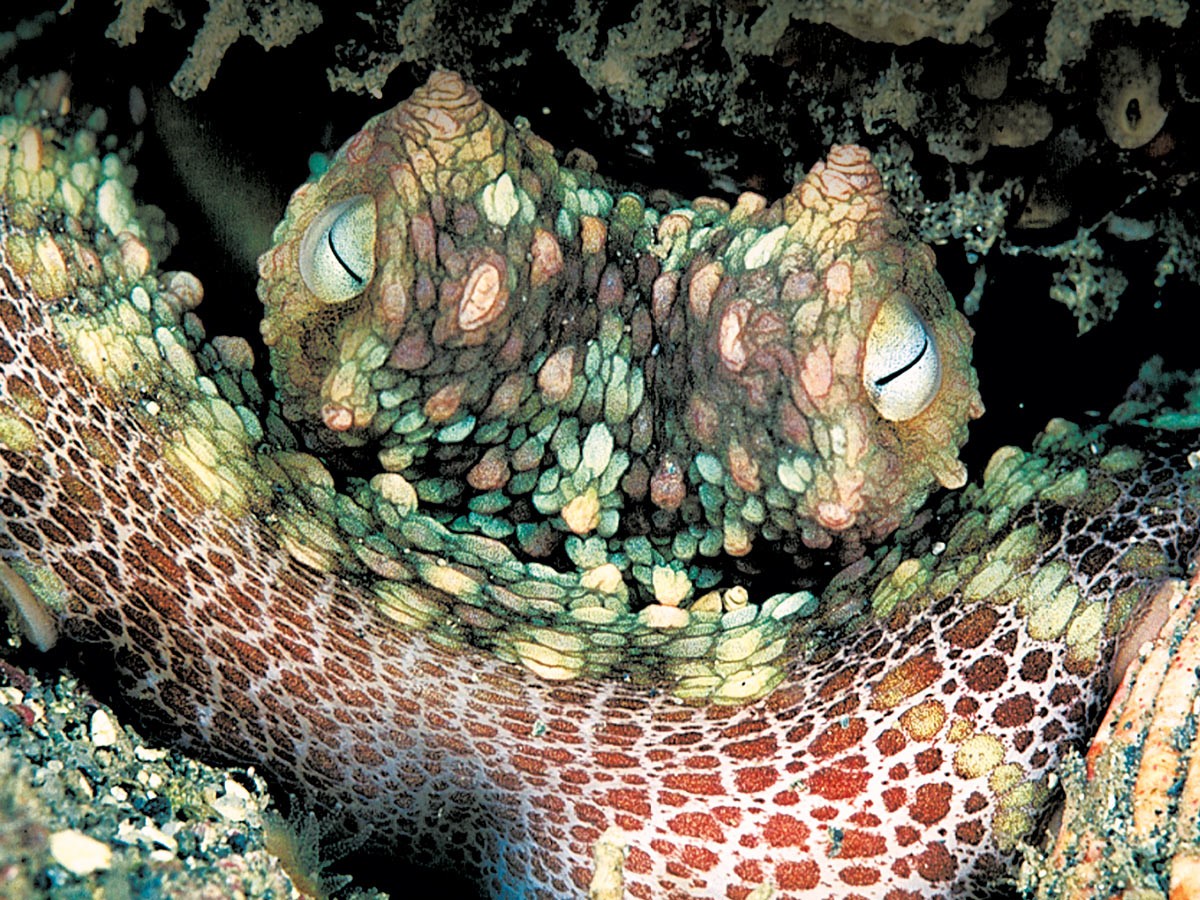The mesmerizing documentary “My Octopus Teacher” captivated audiences worldwide, showcasing the incredible intelligence and complex lives of these eight-armed marine creatures. This film, along with personal encounters in the wild, like those experienced by divers in California waters, sparks a natural curiosity: Could you possibly keep an octopus as a pet, especially in a place like California with its diverse marine life?
The allure of owning such an intelligent and unique animal is undeniable. Imagine observing the color-shifting skin, the problem-solving abilities, and the seemingly alien grace of an octopus right in your own home. Stories abound of divers encountering these shy yet sometimes curious creatures in California’s kelp forests and rocky reefs, further fueling this fascination. Experiences range from observing octopuses like “Spot” in Redondo Beach, who displayed distinct habits and behaviors over months of observation, to surprising encounters under piers or on Malibu beaches.
However, before you start envisioning a custom-built aquarium teeming with an eight-armed companion, it’s crucial to delve into the realities of octopus ownership, particularly within the legal and ethical landscape of California. This article will explore the feasibility of keeping an octopus as a pet in California, considering the legal restrictions, the immense challenges of providing proper care, and the ethical implications involved. We aim to provide a comprehensive overview to inform your curiosity and guide you towards responsible appreciation of these fascinating invertebrates.
The Legal Waters: Is it Legal to Keep an Octopus in California?
The first hurdle in your potential octopus-owning journey is understanding the legal framework in California. California, with its rich biodiversity and commitment to environmental protection, has specific regulations regarding the possession of wildlife, including marine life.
While specific laws may vary and are subject to change, generally, keeping native California octopus species as pets is highly restricted, if not outright prohibited, without proper permits and licenses. California’s Department of Fish and Wildlife (CDFW) regulates the capture and possession of marine organisms. These regulations are in place to protect wild populations, prevent ecological damage, and ensure the welfare of animals.
For most individuals, obtaining the necessary permits to legally keep a native California octopus species as a pet would be exceptionally difficult, if not impossible. Permits are typically granted for scientific research, educational purposes, or public aquariums, not for private pet ownership.
Furthermore, even if you were considering a non-native octopus species, importing and possessing exotic animals in California can also be subject to strict regulations and potential prohibitions, depending on the species and its potential ecological impact.
It is crucial to consult directly with the California Department of Fish and Wildlife to obtain the most up-to-date and accurate information regarding the legality of possessing an octopus in California. Attempting to keep a native octopus as a pet without proper authorization can lead to significant legal penalties, including fines and confiscation of the animal.
The Aquarium Reality: The Challenges of Octopus Care
Even if legal hurdles were somehow overcome, the practical challenges of providing adequate care for an octopus in a home aquarium are immense. Octopuses are not like typical fish or even other marine invertebrates; they are highly intelligent, sensitive, and require very specific and demanding conditions to thrive in captivity.
1. Specialized Habitat: Octopuses need large, meticulously designed aquariums. A standard fish tank simply won’t suffice. They require:
* **Size:** Depending on the species, a single octopus may need a tank of at least 100-200 gallons or even larger. They are active creatures that need space to explore and exhibit natural behaviors.
* **Complexity:** The aquarium needs to mimic their natural environment with plenty of hiding places, rocks, caves, and secure structures. Octopuses are escape artists, so the tank must be absolutely escape-proof, with a tight-fitting lid and no gaps.
* **Water Quality:** Maintaining pristine water quality is paramount. Octopuses are sensitive to changes in water parameters and require stable temperature, salinity, pH, and very low levels of nitrates and other pollutants. This necessitates powerful filtration systems, regular water changes, and meticulous monitoring.2. Dietary Needs: Octopuses are carnivores with a varied diet in the wild, primarily consisting of crabs, shrimp, fish, and clams. Replicating this diet in captivity is challenging and expensive.
* **Live Food:** Ideally, octopuses should be fed live or fresh, high-quality seafood. Frozen food can be used, but it may be less palatable and less nutritious. Sourcing a consistent supply of appropriate live food can be difficult and costly.
* **Feeding Frequency:** Feeding frequency depends on the octopus's age, species, and activity level, but they generally need to be fed several times a week.
* **Messy Eaters:** Octopuses are messy eaters, and uneaten food can quickly foul the water, further complicating water quality management.3. Intelligence and Enrichment: An octopus’s high intelligence is part of its allure, but it also presents significant challenges in captivity. These intelligent creatures require constant mental stimulation and enrichment to prevent boredom, stress, and potentially self-destructive behaviors.
* **Enrichment Activities:** Providing puzzles, toys, and opportunities for exploration and problem-solving is essential. This could involve creating mazes within the tank, providing containers to open for food, or introducing new objects for them to investigate.
* **Interaction:** Some octopus keepers attempt to interact with their pets, but this should be done cautiously and with respect for the animal's boundaries. Forcing interaction can be stressful for the octopus.4. Short Lifespan and Commitment: Many octopus species have relatively short lifespans, ranging from one to a few years. This means the commitment to octopus ownership, while intense, is also relatively short-term compared to many other pets. However, the intensity of care required during that lifespan is exceptionally high.
5. Veterinary Care: Finding a veterinarian with expertise in cephalopod care is extremely difficult. If an octopus becomes ill, treatment options are limited, and prognosis can be poor.
Ethical Considerations: The Octopus as a Pet
Beyond the legal and practical challenges, there are significant ethical considerations surrounding keeping octopuses as pets. Many argue that these highly intelligent and complex creatures are simply not suited for home aquariums.
1. Sentience and Intelligence: Octopuses are increasingly recognized as sentient beings with remarkable cognitive abilities. Their intelligence rivals that of some mammals, and they exhibit complex problem-solving, learning, and even playful behaviors. Confining such intelligent animals to an artificial environment raises ethical questions about their welfare and quality of life.
2. Wild vs. Captive-Bred: The vast majority of octopuses in the pet trade are wild-caught. This practice can contribute to the depletion of wild populations and can be stressful and harmful to the captured animals. Captive breeding of octopuses is still in its early stages and is not yet a viable source for the pet trade for most species.
3. Conservation Concerns: While California’s native octopus species are not currently considered endangered, removing individuals from the wild for the pet trade, even if legal, can have localized impacts on populations and ecosystems.
4. Alternatives to Ownership: For those captivated by octopuses, there are numerous ethical and fulfilling ways to appreciate them without keeping them as pets. These include:
* **Responsible Wildlife Observation:** Snorkeling or diving in California's coastal waters to observe octopuses in their natural habitat, following guidelines for responsible wildlife encounters (approach slowly, don't touch or chase).
* **Visiting Public Aquariums:** Reputable public aquariums often house octopuses in carefully designed exhibits that prioritize their welfare and provide educational opportunities for the public.
* **Supporting Conservation Efforts:** Contributing to organizations dedicated to marine conservation and the protection of octopus habitats.
* **Learning and Education:** Continuing to learn about octopuses through documentaries, books, and scientific research, deepening your appreciation for these incredible animals.California Encounters: Appreciating Octopuses in the Wild
As divers in California have discovered, encounters with octopuses in their natural environment can be truly extraordinary. The original article beautifully illustrates this, recounting experiences with “Spot” and other octopus encounters in California waters. These stories emphasize that the most rewarding and ethical way to experience octopuses is in their wild homes.
California waters are home to several octopus species, including the two-spotted octopus and the red octopus, offering opportunities for respectful observation. Understanding their behavior, habitat, and the tips for finding them (as detailed in the original article, such as looking for middens of shells near crevices) can enhance your chances of a memorable and ethical encounter.
Conclusion: Octopus Admiration, Not Ownership in California
In conclusion, while the allure of keeping a pet octopus in California is understandable, the reality is fraught with legal restrictions, immense care challenges, and significant ethical concerns. For the vast majority of individuals, keeping a pet octopus in California is not a feasible or responsible option.
The complexity of their care, the legal hurdles, and the ethical implications strongly suggest that octopuses are best admired and appreciated in their natural environment or through visits to reputable public aquariums. Instead of pursuing pet ownership, we encourage fostering a deeper understanding and respect for these magnificent creatures through education, conservation efforts, and responsible wildlife observation in the rich marine ecosystems of California. Let’s leave the wonder of octopuses in the wild, where they truly belong.


